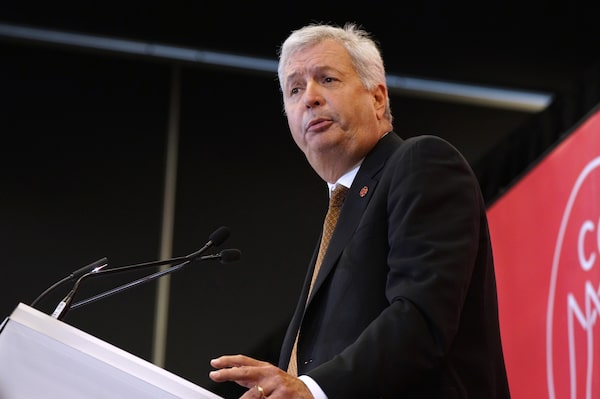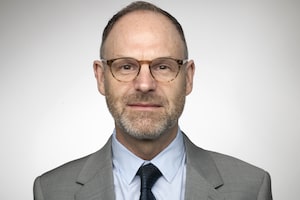
Michael Rousseau has managed to strengthen Mr. Legault’s case for stricter language laws after saying he is just too darn busy to bother learning French.Mario Beauregard/The Canadian Press
Quebec Premier François Legault hardly needed any additional justification for plowing ahead with plans to toughen his province’s language laws. Polls already show that French-speaking Quebeckers overwhelmingly back Bill 96, the proposed legislation that forces more employers – including federally regulated firms – to ensure francophones can work in their mother tongue.
In one of the more curious examples of tone deafness in the upper echelons of the corporate elite, however, Air Canada chief executive officer Michael Rousseau has managed to strengthen Mr. Legault’s case for stricter language laws after saying he is just too darn busy to bother learning French.
After delivering an English-only speech to the Montreal Chamber of Commerce on Wednesday, Mr. Rousseau proceeded to tell reporters that, during his 14 years working at Air Canada’s Montreal head office, he has never found the time to learn the native language of four-fifths of Quebeckers and thousands of the airline’s employees. Besides, he went on, he doesn’t need to.
Air Canada CEO sets off firestorm in Quebec over language comments
“I’ve been able to live in Montreal without speaking French, and I think that’s a testament to the city of Montreal,” explained Mr. Rousseau, who just happens to share the surname of a famous 18th century philosopher whose writings helped spawn the French Revolution.
The Air Canada CEO apparently meant his comments to be a compliment about Montreal’s diversity. But they only served to call up pre-Quiet Revolution memories of the arrogant anglophone bosses who forced their francophone employees to address them in English only. Many of those same bosses were once burned in effigy and helped give life to the Quebec sovereignty movement.
To be sure, there are still plenty of unilingual anglophone bosses in Quebec. But few of them would have the temerity, or foolishness, to brag about their lack of French language skills in public. Especially not as the Coalition Avenir Québec government seeks to force federally regulated businesses – including airlines, banks and railways – to comply with the provisions of the provincial Charter of the French Language, setting up a potential clash with Ottawa.
Air Canada is a former federal Crown corporation that is subject to the Official Languages Act, requiring it to offer services across the country in French and English. But the company has consistently fallen short of this standard, as almost any francophone who has flown with the airline will tell you. No federal institution or department is the subject of more complaints lodged each year with the Official Language Commissioner’s office than Canada’s supposedly bilingual flag carrier.
So, you can’t really blame Quebeckers for not being in much of a forgiving mood toward Mr. Rousseau, who took over as CEO this year.
Mr. Legault called the Air Canada CEO’s attitude “insulting.” Politicians lined up at the National Assembly to denounce Mr. Rousseau, with many of them calling outright for his resignation. The controversy dominated Quebec’s airwaves, news sites and Twitter feeds on Thursday, prompting Mr. Rousseau to apologize.
“In no way did I mean to show disrespect for Quebeckers and francophones across the country,” Mr. Rousseau said in a statement in which he pledged to “improve” his French, something he insisted on Wednesday he had no time to do. “I reiterate Air Canada’s commitment to show respect for French and, as a leader, I will set the tone.”
Quebeckers are used to hearing such promises, and do not put much stock in them. They have learned over the centuries that most anglophones do not care about the survival of the French language in Canada. They know that quite a large number of them would rather Canada’s other official language die out altogether and spare them the inconvenience of having to turn over their cereal boxes to read the ingredients. Hence their determination since the Quiet Revolution to use legislation – first with Bill 101 in 1977, and now with Bill 96 – to protect the status of French in the one province where francophones are still a majority.
A recent Angus Reid Institute survey found that only 9 per cent of English Canadians said they spoke fluent or advanced French, compared to 55 per cent of francophones who claimed fluent or advanced proficiency in English. Outside of Quebec, the needle has barely budged among anglophones since the adoption of the Official Languages Act more than five decades ago. And even Prime Minister Justin Trudeau has come to recognize that the law passed by his father has not lived up to its billing.
“We recognize that, for Canada to be bilingual, Quebec must be first and foremost francophone. And that is why we support Bill 101 and what it does for Quebec,” Mr. Trudeau told the House of Commons last year after one of his Quebec anglophone MPs was castigated for dismissing suggestions that French was threatened in the province, despite the evidence of prominent demographers to the contrary.
Mr. Rousseau, as busy as he is, must have missed that one.
Keep your Opinions sharp and informed. Get the Opinion newsletter. Sign up today.
 Konrad Yakabuski
Konrad Yakabuski